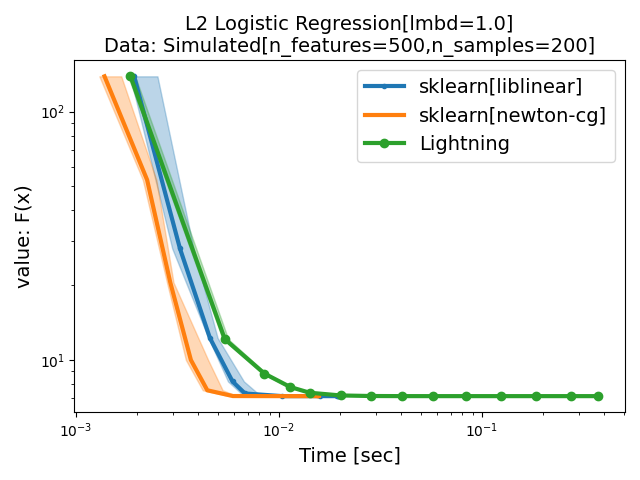(base) ➜ benchmark_logreg_l2 git:(main) benchopt install --env .
Installing 'benchmark_logreg_l2' requirements
Creating conda env 'benchopt_benchmark_logreg_l2':...
done
# Install
Collecting packages:
- 'Python-GD' already available in 'benchopt_benchmark_logreg_l2'
- 'Simulated' already available in 'benchopt_benchmark_logreg_l2'
... done
Installing required packages for:
- cd
- chop
- copt
- Lightning
- sklearn
- covtype_binary
- madelon
- news20
- rcv1
...Traceback (most recent call last):
File "/home/mathurin/anaconda3/bin/benchopt", line 33, in <module>
sys.exit(load_entry_point('benchopt', 'console_scripts', 'benchopt')())
File "/home/mathurin/anaconda3/lib/python3.9/site-packages/click/core.py", line 1128, in __call__
return self.main(*args, **kwargs)
File "/home/mathurin/anaconda3/lib/python3.9/site-packages/click/core.py", line 1053, in main
rv = self.invoke(ctx)
File "/home/mathurin/anaconda3/lib/python3.9/site-packages/click/core.py", line 1659, in invoke
return _process_result(sub_ctx.command.invoke(sub_ctx))
File "/home/mathurin/anaconda3/lib/python3.9/site-packages/click/core.py", line 1395, in invoke
return ctx.invoke(self.callback, **ctx.params)
File "/home/mathurin/anaconda3/lib/python3.9/site-packages/click/core.py", line 754, in invoke
return __callback(*args, **kwargs)
File "/home/mathurin/workspace/benchopt/benchopt/cli/main.py", line 274, in install
benchmark.install_all_requirements(
File "/home/mathurin/workspace/benchopt/benchopt/benchmark.py", line 233, in install_all_requirements
install_in_conda_env(
File "/home/mathurin/workspace/benchopt/benchopt/utils/conda_env_cmd.py", line 181, in install_in_conda_env
_run_shell_in_conda_env(
File "/home/mathurin/workspace/benchopt/benchopt/utils/shell_cmd.py", line 130, in _run_shell_in_conda_env
return _run_shell(
File "/home/mathurin/workspace/benchopt/benchopt/utils/shell_cmd.py", line 68, in _run_shell
raise RuntimeError(raise_on_error.format(output=output))
RuntimeError: Failed to conda install packages ('pip:https://github.com/openopt/copt/archive/master.zip', 'scikit-learn', 'pip:git+https://github.com/scikit-learn-contrib/lightning.git', 'pip:https://github.com/openopt/chop/archive/master.zip', 'numba', 'pip:scikit-learn', 'pip:libsvmdata')
Error:Collecting package metadata (current_repodata.json): ...working... done
Solving environment: ...working... failed with repodata from current_repodata.json, will retry with next repodata source.
Solving environment: ...working... failed with repodata from current_repodata.json, will retry with next repodata source.
Collecting package metadata (repodata.json): ...working... done
Solving environment: ...working... failed
Solving environment: ...working...
Building graph of deps: 0%| | 0/11 [00:00<?, ?it/s]
Examining cython: 0%| | 0/11 [00:00<?, ?it/s]
Examining @/linux-64::__archspec==1=x86_64: 9%|▉ | 1/11 [00:01<00:10, 1.02s/it]
Examining @/linux-64::__archspec==1=x86_64: 18%|█▊ | 2/11 [00:01<00:04, 1.96it/s]
Examining compilers: 18%|█▊ | 2/11 [00:01<00:04, 1.96it/s]
Examining @/linux-64::__unix==0=0: 27%|██▋ | 3/11 [00:01<00:04, 1.96it/s]
Examining @/linux-64::__linux==5.11.0=0: 36%|███▋ | 4/11 [00:01<00:03, 1.96it/s]
Examining pip: 45%|████▌ | 5/11 [00:01<00:03, 1.96it/s]
Examining numpy: 55%|█████▍ | 6/11 [00:02<00:02, 1.96it/s]
Examining numpy: 64%|██████▎ | 7/11 [00:02<00:01, 2.58it/s]
Examining scikit-learn: 64%|██████▎ | 7/11 [00:07<00:01, 2.58it/s]
Examining scikit-learn: 73%|███████▎ | 8/11 [00:07<00:03, 1.11s/it]
Examining numba: 73%|███████▎ | 8/11 [00:16<00:03, 1.11s/it]
Examining numba: 82%|████████▏ | 9/11 [00:16<00:05, 2.72s/it]
Examining @/linux-64::__glibc==2.31=0: 82%|████████▏ | 9/11 [00:20<00:05, 2.72s/it]
Examining @/linux-64::__glibc==2.31=0: 91%|█████████ | 10/11 [00:20<00:03, 3.04s/it]
Examining python=3.8: 91%|█████████ | 10/11 [00:20<00:03, 3.04s/it]
Determining conflicts: 0%| | 0/11 [00:00<?, ?it/s]
Examining conflict for cython pip numpy numba scikit-learn python: 0%| | 0/11 [00:00<?, ?it/s]
Examining conflict for cython numba pip: 9%|▉ | 1/11 [00:03<00:34, 3.42s/it]
Examining conflict for cython numba pip: 18%|█▊ | 2/11 [00:03<00:15, 1.71s/it]
Examining conflict for cython numpy numba scikit-learn python: 18%|█▊ | 2/11 [00:05<00:15, 1.71s/it]
Examining conflict for cython numpy numba scikit-learn python: 27%|██▋ | 3/11 [00:05<00:14, 1.81s/it]
Examining conflict for cython pip numpy numba scikit-learn: 27%|██▋ | 3/11 [00:09<00:14, 1.81s/it]
Examining conflict for cython pip numpy numba scikit-learn: 36%|███▋ | 4/11 [00:09<00:18, 2.58s/it]
Examining conflict for cython pip numba scikit-learn python: 36%|███▋ | 4/11 [00:10<00:18, 2.58s/it]
Examining conflict for cython pip numba scikit-learn python: 45%|████▌ | 5/11 [00:10<00:13, 2.25s/it]
Examining conflict for cython numpy numba scikit-learn __glibc python: 45%|████▌ | 5/11 [00:11<00:13, 2.25s/it]
Examining conflict for cython numpy numba scikit-learn __glibc python: 55%|█████▍ | 6/11 [00:11<00:08, 1.70s/it]
Examining conflict for python pip: 55%|█████▍ | 6/11 [00:14<00:08, 1.70s/it]
Examining conflict for python pip: 64%|██████▎ | 7/11 [00:14<00:08, 2.16s/it]
Examining conflict for numba scikit-learn numpy: 64%|██████▎ | 7/11 [00:14<00:08, 2.16s/it]
Examining conflict for scikit-learn numpy: 73%|███████▎ | 8/11 [00:18<00:06, 2.16s/it]
Examining conflict for scikit-learn numpy: 82%|████████▏ | 9/11 [00:18<00:03, 1.99s/it]
Examining conflict for numba scikit-learn: 82%|████████▏ | 9/11 [00:22<00:03, 1.99s/it]
Examining conflict for numba scikit-learn: 91%|█████████ | 10/11 [00:22<00:02, 2.49s/it]
Found conflicts! Looking for incompatible packages.
This can take several minutes. Press CTRL-C to abort.
failed
UnsatisfiableError: The following specifications were found to be incompatible with a past
explicit spec that is not an explicit spec in this operation (numpy):
- numba -> numpy[version='1.13.*|>=1.10,<1.11.0a0|>=1.11.3,<2.0a0|>=1.16.6,<2.0a0|>=1.14.6,<2.0a0|>=1.9.3,<2.0a0|>=1.12,<1.13.0a0|>=1.14,<1.15.0a0|>=1.13,<1.14.0a0|>=1.11,<1.12.0a0']
- numba -> python[version='>=3.8,<3.9.0a0'] -> pip
- scikit-learn -> numpy[version='>=1.11.3,<2.0a0|>=1.14.6,<2.0a0|>=1.16.6,<2.0a0|>=1.9.3,<2.0a0']
- scikit-learn -> python[version='>=3.7,<3.8.0a0'] -> pip
- scikit-learn -> scipy[version='>=1.1.0'] -> numpy[version='>=1.15.1,<2.0a0']
The following specifications were found to be incompatible with each other:
Output in format: Requested package -> Available versions
Package python_abi conflicts for:
pip -> setuptools -> python_abi=3.8[build=*_cp38]
cython -> python_abi=3.8[build=*_cp38]
numba -> numpy[version='>=1.16.6,<2.0a0'] -> python_abi=3.8[build=*_cp38]
scikit-learn -> numpy[version='>=1.16.6,<2.0a0'] -> python_abi=3.8[build=*_cp38]
numpy -> python_abi=3.8[build=*_cp38]
Package setuptools conflicts for:
numba -> setuptools
scikit-learn -> joblib[version='>=0.11'] -> setuptools
pip -> setuptools
cython -> setuptools
python=3.8 -> pip -> setuptools
Package _libgcc_mutex conflicts for:
numpy -> libgcc-ng[version='>=7.5.0'] -> _libgcc_mutex[version='*|0.1|0.1',build='main|conda_forge']
cython -> libgcc-ng[version='>=7.5.0'] -> _libgcc_mutex[version='*|0.1|0.1',build='main|conda_forge']
python=3.8 -> libgcc-ng[version='>=7.5.0'] -> _libgcc_mutex[version='*|0.1|0.1',build='main|conda_forge']
numba -> _openmp_mutex[version='>=4.5'] -> _libgcc_mutex[version='*|0.1',build='main|conda_forge|main']
scikit-learn -> _openmp_mutex -> _libgcc_mutex[version='*|0.1',build='main|conda_forge|main']
Package libgfortran4 conflicts for:
scikit-learn -> scipy[version='>=1.1.0'] -> libgfortran4[version='>=7.5.0']
numpy -> libgfortran-ng[version='>=7,<8.0a0'] -> libgfortran4=7.5.0
Package pip conflicts for:
python=3.8 -> pip
cython -> python[version='>=3.8,<3.9.0a0'] -> pip
numpy -> python[version='>=3.8,<3.9.0a0'] -> pip
Package certifi conflicts for:
cython -> setuptools -> certifi[version='>=2016.09|>=2016.9.26']
pip -> setuptools -> certifi[version='>=2016.09|>=2016.9.26']
numba -> setuptools -> certifi[version='>=2016.09|>=2016.9.26']
Package libgomp conflicts for:
numba -> _openmp_mutex[version='>=4.5'] -> libgomp[version='>=7.5.0']
scikit-learn -> _openmp_mutex -> libgomp[version='>=7.5.0']
Package wheel conflicts for:
python=3.8 -> pip -> wheel
pip -> wheelThe following specifications were found to be incompatible with your system:
- feature:/linux-64::__glibc==2.31=0
- feature:|@/linux-64::__glibc==2.31=0
- cython -> libgcc-ng[version='>=7.5.0'] -> __glibc[version='>=2.17']
- numba -> libgcc-ng[version='>=7.5.0'] -> __glibc[version='>=2.17']
- numpy -> libgcc-ng[version='>=7.5.0'] -> __glibc[version='>=2.17']
- python=3.8 -> libgcc-ng[version='>=7.5.0'] -> __glibc[version='>=2.17']
- scikit-learn -> libgcc-ng[version='>=7.5.0'] -> __glibc[version='>=2.17']
Your installed version is: 2.31






